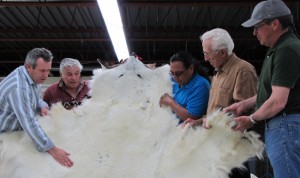Trapping agreement respects Native rights

By Arnya Assance
Trapping today remains a socially and economically important activity for First Nation harvesters in Ontario. First Nations have taken a lead role in developing relationships and partnerships with Ontario and Canada to ensure trapping remains an integral part of First Nation culture and traditions.
The Trapping Harmonization Agreement was first signed between Canada, Ontario and each of the three Provincial Territorial Organizations in 2005, and is still in place today. When entering into this agreement with the Union of Ontario Indians, the Ontario Ministry of Natural Resources committed to:
• Recognizing and respecting Anishinabek rights and traditional values associated with fur harvesting activities
• Increasing participation of aboriginal people in aspects of licensing, training and communications relating to fur harvesting
• Ensuring the sustainable management of fur bearing mammals
• Ensuring the regulated harvest of fur to fulfill the requirements of the Agreement on International Humane Trapping Standards (AIHTS).
Councillor Cliff Meness, Algonquins of Pikwakangan, was one of the leaders involved in establishing the THA.
“The Trapping Harmonization Agreement connects the harvester to a First Nations group, such as the Union of Ontario Indians, knowing they are part of a recognized group of trappers,” says Meness. “It also gives the trapper ‘a go-to person’ – usually a member of council or an administrative individual from their community. The harvesters know that a local person is available to help find out info when necessary. Our community of Pikwakanagan shares information in this way and I would guess it to be the same in other First Nations.”
Under the trapping agreement, the UOI is responsible for issuing trapping licenses to UOI fur harvesters, communicating any changes to the Agreement on International Humane Trapping Standards (AIHTS), provincial regulations or other issues of concern to trappers, collection and reporting of fur harvest information. The cost of the license, which is currently $10, influences the decision to get a UOI-issued one and supports maintaining the agreement.
“Although most harvesters have not read the Trapping Harmonization Agreement they understand the importance of the THA when it is explained and communicated to them,” says Meness.

